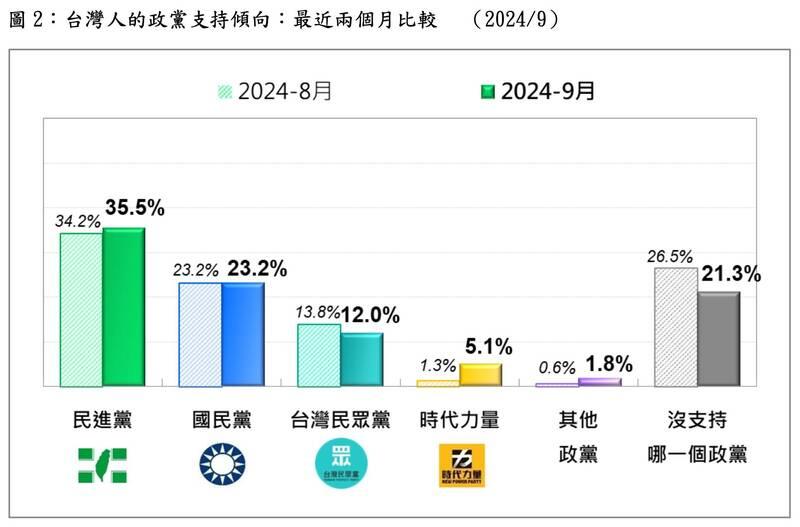Support for the Taiwan People’s Party (TPP) waned only slightly from last month amid a spate of investigations into the party and its members, while backing for the New Power Party (NPP) nearly tripled, a Taiwanese Public Opinion Foundation survey found today.
Asked which political party respondents support the most, the Democratic Progressive Party had the greatest backing at 35.5 percent, up from 34.1 percent last month.
The Chinese Nationalist Party (KMT) was second, unchanged from 23.2 percent.

Photo courtesy of the Taiwanese Public Opinion Foundation
Support for the TPP slipped to 12 percent from 13.8 percent, while those saying they do not support any party declined to 21.3 percent from 26.5 percent the month before.
Foundation chairman Michael You (游盈隆) said that responses were relatively unchanged from last month.
Despite facing an investigation for improper campaign finance reporting and its Chairman Ko Wen-je (柯文哲) being detained during a corruption investigation, support for the TPP only fell 1.8 percentage points, You said.
The two major parties also did not appear to get a boost from the investigations, he added.
However, while the TPP in its heyday was the choice of people aged 20 to 44, it now only leads among the 20-to-24 demographic, he said.
It also lost support among people with advanced degrees and urban professionals, which used to be strong voting blocks for the party, he added.
Another notable change came in support for the beleaguered NPP, whose support jumped to 5.1 percent from 1.3 percent last month.
NPP Chairwoman Claire Wang (王婉諭) said the party does not put too much weight behind opinion polls, but would continue to act as a check on the ruling party while the KMT and TPP “are busy defending corruption suspects.”
The current situation in the legislature is “bizarre,” with many opposition politicians fighting political battles and corruption investigations, leaving no way to properly monitor the minority ruling party, Wang said, vowing to “do well what needs to be done.”
The survey was conducted from Monday to Wednesday last week over telephone, collecting 1,016 valid responses.
Additional reporting by Lin Che-yuan

Thirty-five earthquakes have exceeded 5.5 on the Richter scale so far this year, the most in 14 years, the Central Weather Administration (CWA) said on Facebook on Thursday. A large earthquake in Hualien County on April 3 released five times as much the energy as the 921 Earthquake on Sept. 21, 1999, the agency said in its latest earthquake report for this year. Hualien County has had the most national earthquake alerts so far this year at 64, with Yilan County second with 23 and Changhua County third with nine, the agency said. The April 3 earthquake was what caused the increase in

INTIMIDATION: In addition to the likely military drills near Taiwan, China has also been waging a disinformation campaign to sow division between Taiwan and the US Beijing is poised to encircle Taiwan proper in military exercise “Joint Sword-2024C,” starting today or tomorrow, as President William Lai (賴清德) returns from his visit to diplomatic allies in the Pacific, a national security official said yesterday. Commenting on condition of anonymity, the official said that multiple intelligence sources showed that China is “highly likely” to launch new drills around Taiwan. Although the drills’ scale is unknown, there is little doubt that they are part of the military activities China initiated before Lai’s departure, they said. Beijing at the same time is conducting information warfare by fanning skepticism of the US and

Chinese President Xi Jinping (習近平) is unlikely to attempt an invasion of Taiwan during US president-elect Donald Trump’s time in office, Taiwanese and foreign academics said on Friday. Trump is set to begin his second term early next year. Xi’s ambition to establish China as a “true world power” has intensified over the years, but he would not initiate an invasion of Taiwan “in the near future,” as his top priority is to maintain the regime and his power, not unification, Tokyo Woman’s Christian University distinguished visiting professor and contemporary Chinese politics expert Akio Takahara said. Takahara made the comment at a

DEFENSE: This month’s shipment of 38 modern M1A2T tanks would begin to replace the US-made M60A3 and indigenous CM11 tanks, whose designs date to the 1980s The M1A2T tanks that Taiwan expects to take delivery of later this month are to spark a “qualitative leap” in the operational capabilities of the nation’s armored forces, a retired general told the Liberty Times (sister paper of the Taipei Times) in an interview published yesterday. On Tuesday, the army in a statement said it anticipates receiving the first batch of 38 M1A2T Abrams main battle tanks from the US, out of 108 tanks ordered, in the coming weeks. The M1 Abrams main battle tank is a generation ahead of the Taiwanese army’s US-made M60A3 and indigenously developed CM11 tanks, which have